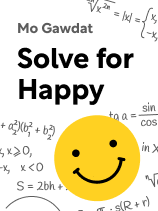

This article is an excerpt from the Shortform book guide to "Solve for Happy" by Mo Gawdat. Shortform has the world's best summaries and analyses of books you should be reading.
Like this article? Sign up for a free trial here.
How can it be dangerous to make assumptions? Why should you be careful when making predictions? Why are stereotypes harmful?
In Solve for Happy, Mo Gawdat discusses several weaknesses (or “blind spots,“ as he calls them) that can cause you to be unhappy. Some of these are faulty assumptions that can take the form of predictions or stereotypes.
Read more to understand why you make faulty assumptions and learn how you can mitigate them.
Faulty Assumptions
Despite the abundance of information available to your brain, there are instances where your information is incomplete. In such instances, your brain makes assumptions to fill in the gaps, creating a comprehensive set of information for decision-making.
In pre-modern societies, our lives were less complex, and these assumptions were more accurate. For instance, if you were being chased by a tiger with its teeth bared, you could safely assume the tiger wanted to eat you. However, given the complexity of the modern world, these black-and-white assumptions can lead us astray. For example, you might assume a quiet coworker is upset at you when they might just be under the weather.
These faulty assumptions skew our perceptions of reality and prevent us from solving the happiness formula. To avoid such faulty assumptions, Gawdat recommends reevaluating what you “know” and retaining only beliefs that you’ve verified with your senses.
(Shortform note: In Feeling Good, David Burns argues that assumptions often yield cognitive distortions when they lead us to inaccurately perceive reality. These distortions, he claims, consequently lead to an increased chance of anxiety and depression. In turn, he advocates cognitive behavioral therapy, which attempts to remedy these mental health issues by finding and replacing false assumptions with truths.)
Predictions
Similarly, we tend to make faulty assumptions about the future. Gawdat explains that these inaccurate predictions are often self-fulfilling, harming our ability to solve the happiness formula.
First, our predictions are inaccurate because we often extrapolate from relatively few data points. For example, a friend might tell us that an obscure diet helped them lose weight, from which we form the unfounded belief that we’ll enjoy the same results of that diet.
(Shortform note: Frequently, our intuition causes these false predictions because it extrapolates from relatively little data. Since it developed to perceive patterns amidst randomness, our intuition often yields false positives, finding alleged patterns when there are none. For instance, we might intuitively commit the gambler’s fallacy, like when those playing roulette conclude that the ball is likely to land on red after landing on black.)
Second, our predictions are often self-fulfilling because they influence our actions. For instance, if you hear that your next Calculus test will be so hard that you’re guaranteed to fail, you might decide it’s pointless to study, thus ensuring that you’ll fail.
(Shortform note: Although Gawdat focuses on the detrimental effects of self-fulfilling predictions, researchers have also argued that they can be used to our benefit. In particular, by predicting that a positive event will come to pass, we can increase the likelihood of actualizing that event. For example, students who predict that they’ll succeed on their next test might become more confident and relaxed during the test, thus increasing their performance.)
Our false predictions instill unfounded expectations and prevent us from fulfilling the happiness formula. To temper these expectations, remind yourself that your predictions aren’t infallible.
(Shortform note: In Expert Political Judgment, Philip Tetlock researched political predictions specifically, finding that experts struggled to predict political change with any significant degree of accuracy. However, he found that people who evaluated multiple explanations before making a prediction fared better than people who focused on a single explanation before making a prediction. So, to improve our own predictions, it’s reasonable to conclude that we should evaluate all available explanations.)
Stereotypes
Sometimes we make faulty assumptions about other people. Stereotypes are labels of certain groups and characteristics on the basis of limited past experience. Because we extrapolate labels from limited data, they’re often inaccurate and harmful. Why are stereotypes harmful? We might, for example, know several successful Asian students and label all Asians academically gifted. This oversimplification, Gawdat argues, obviates nuanced truths. Consequently, these stereotypes can falsify our perceptions and preempt the possibility of happiness.
(Shortform note: In his book, Outsiders, sociologist Howard Becker developed labeling theory, which holds that the labels ascribed to us tangibly influence our behavior. More specifically, Becker argues that labeling certain individuals as “criminals” or “deviants” leads to their being stigmatized, making it more likely that they’ll ultimately resort to criminal activity. Thus, merely labeling others as criminals may lead them to becoming criminals.)
To minimize this harm, use extreme scrutiny when you catch yourself using a label. Often, this scrutiny will reveal that your stereotypes are ill-founded.
| How to Deal With Subconscious Labels Gawdat’s recommendation to scrutinize stereotypes presupposes that we’re consciously aware of them, but many labels arise via implicit bias, or subconscious prejudice. In Biased, Jennifer Eberhardt argues that these implicit biases are the result of categorization, the brain’s process of automatically sorting entities into different groups to distill order from chaos. Categorization leads to stereotypes, where we form generalizations about others from demographic information, like race, gender, and age. Consequently, we must intervene in the categorization process to prevent stereotypical labels from taking root. One way to do so involves actively seeking new information about others. According to Philip Tetlock and Dan Gardner, authors of Superforecasting, new information hinders our brain’s ability to categorize others because of the dilution effect, which states that new information dilutes the value of past information, like the categories used by the brain. |

———End of Preview———
Like what you just read? Read the rest of the world's best book summary and analysis of Mo Gawdat's "Solve for Happy" at Shortform.
Here's what you'll find in our full Solve for Happy summary:
- The six misconceptions that cause us to suffer
- How to remove the seven weaknesses that hinder your happiness
- The five pillars to becoming permanently happy






